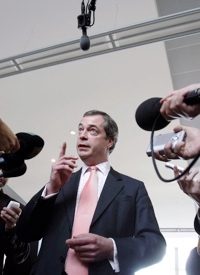
The viral exposure of a video of an anti-European Union speech given earlier this week at European Parliament has some political analysts wondering if England will see the rise of its own Tea Party movement, as much of the sentiments articulated throughout the speech echo the concerns addressed by America’s Tea Parties.
Nigel Farage, leader of the UK Independence Party and co-president of Europe of Freedom and Democracy (EFD), and renowned “euroskeptic,” spoke out against the European Union this week at Parliament for a number of reasons. (Watch video.)
First, Farage criticized those who continue to tout the European Union as good for Europe. He declared:
“The whole edifice is beginning to crumble, there’s chaos, the money is running out … Just look around the chamber this morning. Look at the fear, look at the anger…. They’re beginning to understand that the game is up, and yet in their desperation to preserve their dream, they want to remove any remaining traces of democracy from the system. And its pretty clear that none of you have learned anything.”
Specifically addressing one loyal proponent of the EU, who asserted that “the Euro has brought stability,” Farage joked, “I suppose I could applaud you for having a sense of humor but isn’t this really just the bunker mentality.”
Farage went on to contend that the “fanaticism” of the EU proponents is “out in the open.”
Farage also berated the EU for allowing member states to get into debt and then bailing out the member states at the expense of the ordinary people of Europe. He asserted that the actions taken by the European Union pose threats to democracy.
During his impassioned speech, Farage declared, “We don’t want that flag, we don’t want the anthem, we don’t want this political class. We want the whole thing consigned to the dustbin of history.”
Specifically addressing the recent bailout of Ireland, he noted that when a member state is bailed out by the European Union, that very state loses its autonomy:
They should never have ever joined the Euro. They suffered from low interest rates, a false boom and a massive bust. But look at your response to them. What they’re being told as their government is collapsing is that it would be inappropriate for them to have a general election. In fact, they were told they had to have an agreed budget first before they are allowed to have a general election. Just who the hell do you think you people are!
He concluded, “You are very, very dangerous people indeed. Your obsession with creating this Euro state means that you’re happy to destroy democracy. You appear to be happy that millions and millions of people are unemployed and for them to be poor. Untold millions must suffer so that your Euro dream could continue.”
He also warned that Greece and Ireland were only the beginning, as Portugal and Spain will soon follow, bleeding the well of EU bailout money dry — and when that happens, the state of the European economy will likely be unrecoverable.
But Farage declares that to be the least of the problems that would arise. “If you rob people of their identity, if you rob them of their democracy, then all they are left with is nationalism and violence. I can only hope and pray that the Euro project is destroyed by the markets before that really happens.”
This was not the first, and undoubtedly will not be the last, occasion in which Farage — a leading critic of the European Union — has denounced the massive body. He has often asserted that it is the antithesis of British liberty.
Farage has also staunchly criticized Prime Minister Gordon Brown for his assertions that European countries are “better off together than ever we are apart.” He has also verbally reprimanded Brown for “ramming the Lisbon Treaty through the British Parliament,” saying Brown did it “breaking a specific pledge that he would give the British people a referendum on the treaty.”
Likewise, Farage has targeted Prime Minister David Cameron, whom he asserts “abandoned” the ideals of national and local independence, deregulation, tax cuts, immigration and withdrawal from the European Union.
Farage has declared, “We believe in national independence. But we also want to see a much greater degree of independence at [the] local level, believing that one of the world things that the Tories did in the 1980s was to emasculate local government.”
Most importantly, perhaps, Farage has stated that the United Kingdom Independence Party could become Britain’s equivalent of the Tea Party, reported the Wall Street Journal.
As Farage and his Party espouse similar tenets to those supported by the American Tea Party, it certainly is not a far leap. And with a charismatic, passionate leader such as Nigel Farage at the helm, the British Tea Party movement could certainly be a successful, and entertaining, one to watch progress.
Photo, rotator graphic and above: British MEP Nigel Farage, center, speaks at the European Parliament in Brussels, March 2, 2010: AP Images



